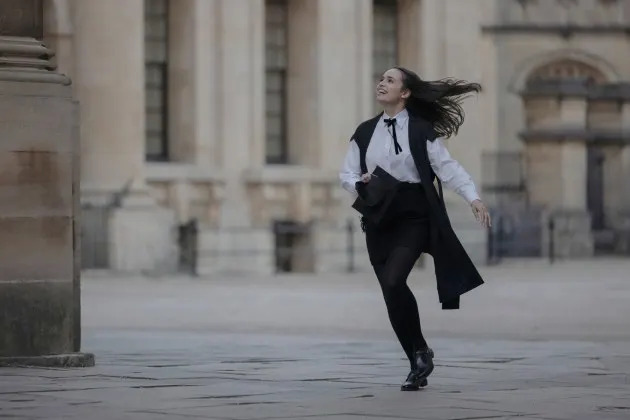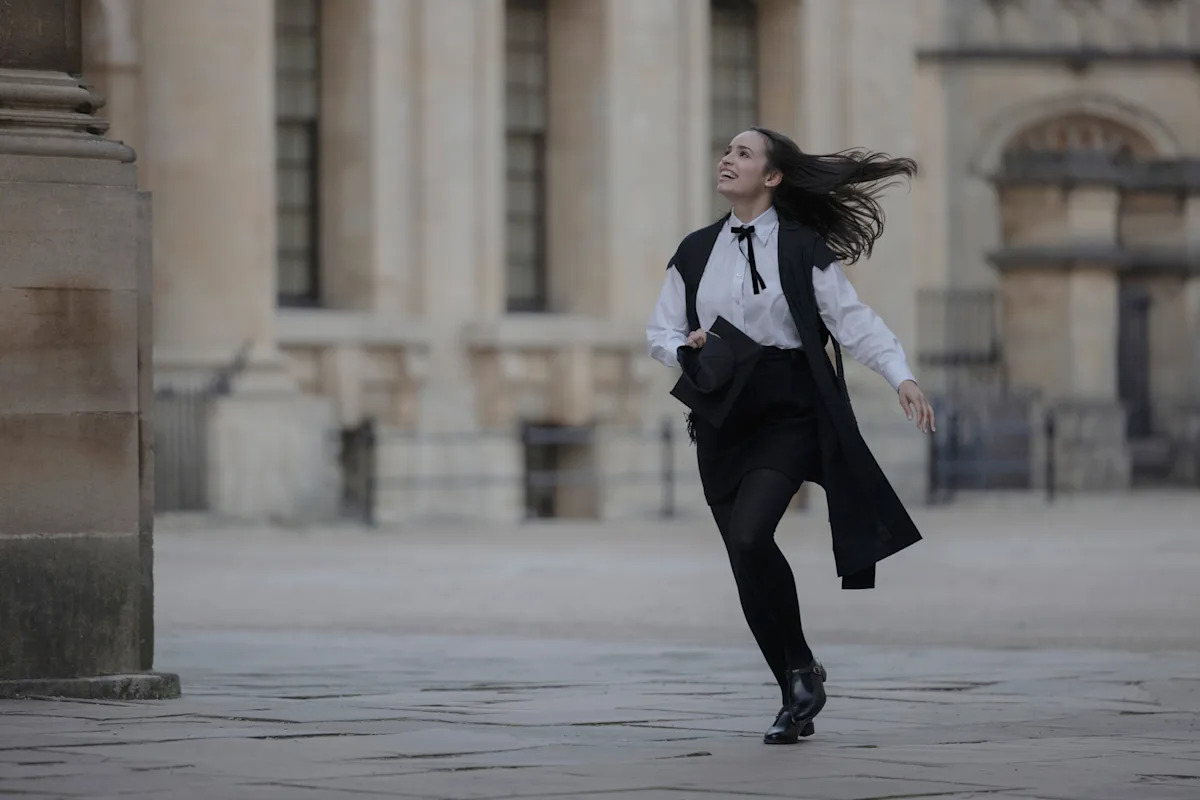
Netflix show ‘My Oxford Year’ is based on Julia Whelan’s 2018 literary debut – Credit: Chris Baker/Netflix
The project that changed Julia Whelan’s life was a huge success and one of her biggest frustrations all at the same time: Gillian Flynn’s 2012 crime novel Gone Girl.
Flynn’s tale following professor Nick Dunne and the mysterious disappearance of his wife Amy was a New York Times bestseller and the inspiration for an Oscar-nominated film. The book eventually sold more than 10 million copies — including sales of the audiobook, which was beloved for Whelan’s smooth and melodic voice acting performance of Amy. Flynn, the various book agents, the book’s editor, and the publisher all received substantial royalties for the continued success of Gone Girl. Whelan and fellow voice actor Kirby Heyborne, who narrated the part of Nick, each got a check for $2,500 and not a single cent more. “I always joke that that’s my villain origin story,” Whelan tells Rolling Stone.
More from Rolling Stone
While Whelan might not be a household name, her impact on the literary landscape is undeniable. She’s one of the most sought-after audiobook narrators, the voice behind more than 600 famed titles, including Emily Henry’s Happy Place, Rebecca Makkai’s I Have Some Questions For You, and Otessa Moshfegh’s BookTok hit My Year of Rest and Relaxation. The New Yorker has called her the “Adele of audiobooks.” She was nominated for a Grammy for audiobook direction. Oh, and she also writes her own screenplays and novels.
On Aug. 1, Netflix will premiere My Oxford Year, the film adaptation of Whelan’s 2018 literary debut. But while the new film should, and very well could, be a breakthrough moment for Whelan, right now she has a different focus: Whelan wants to harness the rising interest in audiobooks — and her own influence in the space — to secure better deals for narrators. And she’s doing this rather unsexy work through an unlikely medium: romance novels.
“When you’re dealing with books about emotional connection, about relationships, audiobooks are unmatched,” Whelan explains “But narrators are not part of the system of success. We’re so far beyond it’s not fair. It’s actually unethical.”
Whelan wrote and recorded the audiobook version of My Oxford Year in the midst of a heavy slate of narration work. It was a grueling schedule — she recorded 70 books in 2017 — and one that she says highlighted just how many “standard” audiobook industry practices were setting up actors to fail, or worse, endanger their health and well-being. The average audiobook voice actor is paid per finished hour, so they get a set price when they turn in the recording of a finished book, which can clock in anywhere from eight to 17 hours. But what those payments don’t address is the time spent recording. For every completed hour of audio someone like Whelan produces, it takes several more to actually record. This means voice actors are pushing to spend as little time as possible on one project before hopping to another, adding on pressure and stress. For her, Whelan says it led to a serious emotional and physical breakdown.
“Audiobooks are so poorly paid that you really have to do volume to keep your head above water,” she says. “I had to go on vocal rest because I got a cold. I got back in the studio too soon, because I was so worried about meeting a deadline. It turned into laryngitis. I went in to see a doctor, and they just said, ‘You have to not talk for a month or you’re probably never going to do this again.’ That’s why I think it’s a very dangerous model to only get paid per finished hour, as opposed to being incentivized through a royalty structure when the books do well.”
Whelan’s answer to this at the moment? Romance audiobooks. Romance might seem like a poor answer to institutionalized long hours and poor pay, but Whelan notes that the pandemic drove up the popularity and success of the medium, a growth that’s still continuing nearly five years later. During Covid lockdown, people became obsessed with romance — especially listening to these stories as told by voice actors. According to the Audiobook Publishers Association, sales grew another 13 percent in 2024, maintaining their existence as a multibillion-dollar industry. Audio versions of books have gotten so popular that in 2024, HarperCollins reported that audiobook sales surpassed e-books for the first time in the publisher’s history. Even with those stats, Whelan is intimately aware of how many people dismiss romance as less intellectually rigorous than literary fiction, mostly because she used to do that herself.
“I’d been through a creative writing program that basically told me genre was not worth anybody’s time. And when I started doing this job, and I had to read things that were just being given to me that I would have never picked up on my own, I realized that there’s incredible writing across all categories,” she says. “I’ve very much enjoyed finding the authors who came out of writing programs and have specifically chosen to write in genre because they don’t like this ivory-tower gatekeepy thing that says, you know, if there’s a plot, it’s not literature. I’m very radicalized about this.”
This growing interest in romance audiobooks is also happening alongside an investment in artificial intelligence by tech companies. Readers want more to listen to — and major publishing companies are trying to answer that demand by using AI. Amazon’s Audible is deploying dozens of options for AI narration. (This includes the audiobook for Melania Trump’s memoir Melania, which was created using AI-generated audio tracks.) For audiobook narrators already fighting for better pay, AI can seem like a hovering hammer. But while Whelan acknowledges the challenge, she notes that a large majority of audiobook listeners still prefer non-AI narrators.
“As we’re all collectively trying to define what it means to be human right now, I think that we will want to hear real humans telling us real human stories,” Whelan says. “I’ve said this jokingly to a lot of the male narrators: ‘You guys are going to be the last one standing when the robot apocalypse happens.’ Because women are always going to want to hear real men say naughty things in their ear.”
In 2024, Whelan launched Audiobrary, a digital audiobook platform meant to host new audio-first projects and give the artists involved royalties based on performance. Some of the library’s most anticipated projects are unique takes on romance. The debut release was Cassanova LLC, a steamy read taken directly from the pages of Whelan’s second romance novel, Thank You For Listening. The most recent release is a new recording of Sierra Simone’s 2016 Arthurian-inspired romance American Queen.
“[Audiobooks are] a multibillion-dollar industry with double-digit growth year over year for the last decade, [but] the audiobook narrator’s rates have not followed that kind of growth,” Whelan says. “It was getting to the point where I was so resentful of that, I was having a hard time getting in the booth and doing my job. So I had to feel like I was doing something. Audiobrary is just literally coming out of righteous rage.”
Following today’s release of My Oxford Year, Whelan is already back to recording her ongoing slate of projects. But she notes that while the audio world is bigger than ever — including a recent TikTok obsession with audio erotica — her focus remains specifically on audiobooks. “I would want to find the right script or situation to do [different voice acting], but I don’t have time,” she says.
Best of Rolling Stone
Sign up for RollingStone’s Newsletter. For the latest news, follow us on Facebook, Twitter, and Instagram.
